CEDAR News
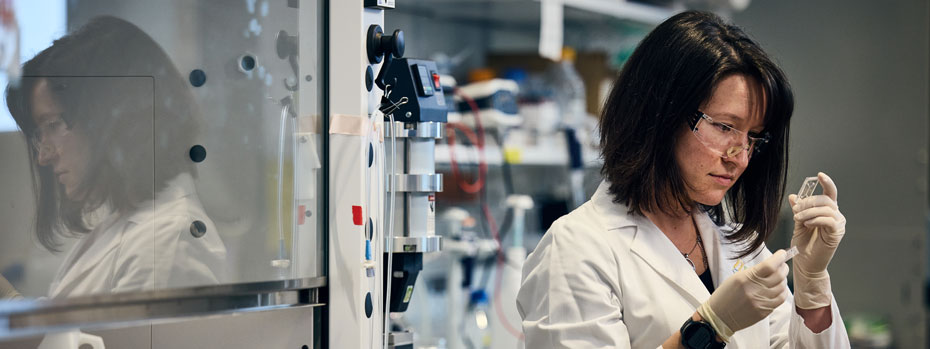
CEDAR researchers develop new tool to help understand cancer as an integrated system
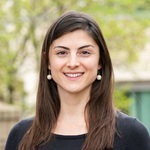
Researchers at CEDAR have developed scMKL, a new tool that better integrates interpretability and predictive power by analyzing a cell’s gene expression and chromatin accessibility—then showing how those layers interact. Today’s cancer researchers can classify tumors with striking accuracy, but the algorithms behind these advances often predicted outcomes without revealing causes. This forces a trade-off between accuracy and understanding—with powerful machine learning models that can’t be interpreted, or interpretable models that can’t keep up with advances.
ScMKL, published in Communications Biology as part of the Applications of Artificial Intelligence in Cancer collection, groups genes into biological pathways and chromatin regions into transcription-factor binding sites. It then integrates the datasets to identify which transcription factors in the chromatin drive which gene programs. By making machine learning more interpretable, scMKL enables mechanistic discovery that drives better treatments and earlier detection.
The method was validated across seven datasets spanning four cancer types—breast, prostate, lymphoma, and lung—and three sequencing technologies. The team released the code openly, reflecting a commitment to transparency and to making complex biology comprehensible both to machine and to scientists working to cure disease.
“By integrating computational innovation with biological knowledge,” said Cigdem Ak, Ph.D., postdoctoral scholar at CEDAR and corresponding author, “we’re helping the broader research community generate mechanistic insights that could ultimately guide early detection and treatment development.”
CEDAR graduate student develops new diagnostic technology

CEDAR Ph.D. candidate Kenneth Riley, under the mentorship of CEDAR member and associate professor in the Department of Molecular and Medical Genetics Thuy Ngo, was recently profiled by the OHSU Foundation. Riley, who was named Early Career Innovator at the 2025 OHSU Innovation Awards, has developed a new diagnostic technology that could detect cancer by analyzing changes in DNA from a patient’s blood sample. The technology uses epigenetics, the study of DNA modifications and how they change the way DNA is organized three-dimensionally within a cell. This controls whether genes are turned on or off, and abnormal modifications can be used to detect disease in a minimally invasive way.
“It just goes to show how much OHSU and the Knight Cancer Institute have given us the platform to do projects like this,” Riley said. “The resources we have, the collaboration, the connection to clinicians, the patient samples, the generous people who have volunteered to give their blood, all these things need to come and work together for this to be able to happen. The entire platform has allowed students like me — who come in excited to learn— to have that great progress because of what we have set up here.”
Read more about Riley, and the mentorship provided by Ngo and her lab, at the OHSU Foundation.
CEDAR researchers develop blood test that identifies pancreatic cancer with 85% accuracy
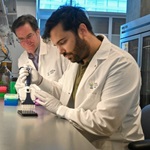
CEDAR researchers have developed a new blood test that could help detect pancreatic cancer earlier. The test, “protease activity-based assay using a magnetic nanosensor” (or PAC-MANN) uses a small blood sample to detect changes in protease activity — a key indicator of pancreatic ductal adenocarcinoma (PDAC), the most common and deadly form of pancreatic cancer.
The study detailing the new test was published in the journal Science Translational Medicine. CEDAR assistant professor Jared Fischer and research engineer Jose Luis Montoya Mira are the corresponding author and lead author, respectively.
“The problem with pancreatic cancer is that we often catch it too late,” Fischer said. “Our goal with PAC-MANN is to give clinicians a tool that can detect the disease much earlier, when more treatment options are available and there is a better chance of survival.”
Read more on OHSU News. The discovery has also received extensive media coverage from Forbes, the Willamette Week, the New York Post and Axios, among others.
Josh Moreau lab explores the role of B cells in non-lymphoid tissues.
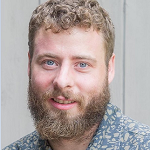
Scientists are uncovering new insights into B cells, which are immune cells long recognized for their role in producing antibodies. A review by OHSU researchers published in Nature Reviews Immunology, reveals that B cells do much more. They work directly at areas of inflammation, where they become long-lasting cells that stay in the body. These cells can affect how diseases progress and how the body responds to treatments.
Joshua Moreau, assistant professor in the Division of Oncological Sciences and a member of CEDAR, is corresponding author on the review along with Lauren Rodda, assistant professor of molecular microbiology and immunology in the OHSU School of Medicine. Researchers are working to identify definitive markers for tissue-resident memory B cells and to map the molecular pathways that govern their activity. Gaining a deeper understanding of tertiary lymphoid structures formation and function could lead to new treatments that harness B cells to fight infections and cancers more effectively. OHSU News has more information on the report.
CEDAR researchers profile protease activity in PDAC cancer
Pancreatic cancer is challenging to detect early, and biopsy is higher risk than for other cancers. Using a low-cost, high-throughput assay, a new study from CEDAR researchers demonstrates there is a unique protease activity "signature" made up of specific substrates for pancreatic ductal adenocarcinoma (PDAC) that differs from benign pancreatic disease.
Once research establishes what specific substrates are present, a simple and inexpensive assay can be developed, potentially providing primary care physicians a tool to expedite diagnosis for patients. This could have a particular impact on growing cancer disparities in Black communities, where rates of pancreatic cancer are highest.
The paper, by first author and CEDAR senior research assistant Morgan Stewart, senior author and CEDAR Assistant Professor Adem Yildirim, and a team of CEDAR researchers, is available in Scientific Reports.
Carolyn Schutt Ibsen recognized as an innovator in bioengineering

Carolyn Schutt Ibsen, assistant professor of biomedical engineering, OHSU School of Medicine, with a joint appointment with CEDAR, was recognized as a Young Innovator in Cellular and Molecular Bioengineering at the 2024 Biomedical Engineering Society meeting in October. The Young Innovator Award is issued by the journal Cellular and Molecular Bioengineering (CMBE), which selects a group of early-career faculty for their innovative and impactful bioengineering research.
Dr. Schutt Ibsen’s research details the development of a new coaxial 3D bioprinting technique for remote-controlled gene delivery and was conducted with lead author Mary (Kylene) Lowrey, a biomedical engineering Ph.D. student in Dr. Schutt Ibsen’s group. Their paper is featured in the October Young Innovators Issue of CMBE.
Luiz Bertassoni named an inspiring Latinx scientist

Luiz Bertassoni was selected as an inspiring Latinx/Hispanic scientist by the Fred Hutchison Cancer Center. Bertassoni was named to the Atlas of Inspiring Hispanic/Latinx Scientists, a grassroots effort to develop a showcase for the expertise, talents, and diversity of Hispanic and Latinx scientific faculty. Scientists were identified through a nomination system.
“For rising generations of scientists, this atlas is about providing a forum of role models,” said Tina Termini, Ph.D., an assistant professor in the Translational Sciences and Therapeutics and Human Biology Divisions at Fred Hutch. “It has the potential to reinforce the identity of Hispanic and Latinx scientists and show that it is possible to achieve careers in all these different fields.” Bertassoni is an OHSU professor, member of CEDAR and director of the Knight Cancer Precision Biofabrication Hub.
CEDAR graduate student awarded for oral presentation

CEDAR graduate student Nikita Sehgal was awarded her oral presentation at the 2024 Northwest Society for Biomaterials Regional Symposium. Sehgal's presentation, "Dendrimer-microbubble complexes as ultrasound-activated nanocarriers for precision cancer gene therapy," received third place. Sehgal's CEDAR faculty adviser is Carolyn Schutt Ibsen. Her current research focuses on developing ultrasound-responsive microbubble-nanoparticle conjugates for precision cancer therapy.
Brian Druker highlights Knight Cancer Institute work in KGW interview

The Knight Cancer Institute's Brian Druker appeared on KGW's "The Story" in a two-part interview, discussing his development of the crucial cancer-fighting medication Gleevec, the Knight's interest in furthering precision oncology, and the institute's work in advancing early detection, including the establishment of CEDAR.
"We've deliberately designed it to be multidisciplinary," Druker told KGW's Pat Dooris. "So it's cancer biologists, it's mathematicians, it's engineers, it's computationalists, it's all sorts of different disciplines to try to attack a huge problem to advance the field. And I've always talked about this kind of like a Bell Labs. It's bringing lots of different disciplines together, bringing them and focusing them on a problem and then watching incredible things happen." Read or watch part one here, and part two here.
CEDAR graduate students awarded fellowships
CEDAR Ph.D. students Nikita Sehgal and Kira Lynch were awarded N.L. Tartar Trust Fellowships based on their research proposals. The fellowships award $2,000 to support research endeavors and research career development in the OHSU School of Medicine, including conference attendance, equipment and specialized lab services.
Lynch's proposal investigates the role of endothelial cells in the link between cardiovascular disease and breast cancer progression. Sehgal's proposal is developing novel dendrimer-microbubble complexes as ultrasound-activated nanocarriers for precision cancer gene therapy. Sehgal was also awarded a professional development scholarship from Women in Science Portland.
CEDAR graduate student receives honor from National Science Foundation
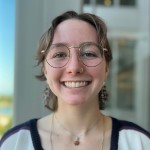
CEDAR graduate student Kira Lynch received an honorable mention for the National Science Foundation's Graduate Research Fellowship Program. Every year, the National Science Foundation awards fellowships to high-potential individuals early in their careers. Since the program's founding, more than 40 former fellows have been awarded the Nobel Prize, and more than 400 have been elected as members to the National Academies of Sciences, Engineering, and Medicine.
Lynch studies with professor Monica Hinds and assistant professor Carolyn Schutt Ibsen, using biofabrication techniques to model the tumor vasculature and study how endothelial cell state influences cancer progression in the context of 3D tissues. Every cycle the National Science Foundation receives more than 12,000 applications. Lynch is one of the 1,788 students to receive an honorable mention.
CEDAR microfluidics research profiled by Oregon Business
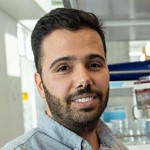
CEDAR's Jose Luis Montoya Mira, a research engineer, is central to a story in Oregon Business profiling the Corvallis Microfluidics Tech Hub, an industry coalition led by Oregon State University. The group was designated as a national Tech Hub by the U.S. Commerce Department's Economic Development Administration, and includes 40 institutes, companies and municipalities, including OHSU.
The hub is dedicated to bolstering the Pacific Northwest's microfluidics industry through collaboration, with a focus on bringing the technology to commercial scale. Montoya Mira uses microfluidics for cellular study, including research into "hybrid" cancer cells—cells that are a blend of tumor and blood cells, used by tumors to spread throughout the body.
Nima Nabavizadeh named CEDAR CMO
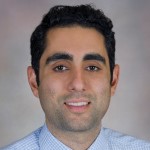
Nima Nabavizadeh, M.D., was named chief medical officer for CEDAR. Nabavizadeh is an associate professor in the Department of Radiation Medicine and program director for the radiation oncology residency. He previously served as director of early detection clinical research at CEDAR, and he is principal investigator for a number of early detection studies.
In his new role, Nabavizadeh will continue to lead clinical trials at CEDAR, but will also be part of the center’s leadership team, working with Sadik Esener, Ph.D.; Shelley Barton, Ph.D.; Beverly Emerson, Ph.D.; and others in guiding CEDAR’s mission, vision and values.
“It’s been so fun being a part of our early detection clinical trials group and seeing the exciting future of cancer screening firsthand. I’m also really excited for this expanded role within CEDAR,” Nabavizadeh said. “As a radiation oncologist, I have many clinical partners and colleagues across disease sites and specialties. I hope to serve as the clinical link between our clinicians and CEDAR scientists. Fostering these collaborations will maximize the impact of OHSU’s early detection scientific discoveries on patient care and public health while advancing the career of CEDAR scientists and Knight clinical faculty."
CEDAR faculty awarded Kuni grant
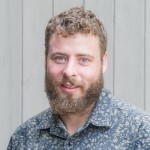
CEDAR Assistant Professor Josh Moreau received a Kuni Foundation Imagination Cancer Research Grant. The Kuni Foundation annually awards grants for up to three years to support early and mature cancer research with goals of improved detection, treatment, and outcomes. Moreau received $85,000 for investigating the role of PM2.5 air pollution in skin cancer immunity.
Jessica Riesterer elected director of MAS
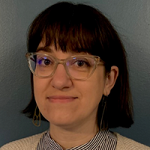
CEDAR Scientist Jessica Riesterer was elected as a director to the Microanalysis Society of America (MAS). The society is a nonprofit professional association dedicated to the advancement of microanalytical principles, instrumentation and applications. MAS provides local, regional, national and international forums for the exchange of questions and solutions regarding microanalysis problems across scientific disciplines.
The more than 600 members of MAS include academic, industrial and government researchers, and commercial product developers with specialties in materials science, geology, physics, chemistry and biological sciences. Her three-year term started in January 2024.
CEDAR faculty member selected for award

The National Science Foundation selected CEDAR Assistant Professor Carolyn Schutt Ibsen, Ph.D., for its Faculty Early Career Development (CAREER) Program, which supports early-career faculty who have the potential to serve as academic role models in research and education and to lead advances in the mission of their department or organization.
Ibsen’s $615,500 award will fund her development of a 3D printable “bioink” that allows deep-penetrating ultrasound to trigger the delivery of genetic material to cells. The ultrasound waves can be focused to small spots within the 3D bioprinted structure to create desired patterns of gene delivery by activating embedded ultrasound-responsive particles.
CEDAR students receive honors
Several CEDAR graduate students were awarded for presentations and posters at symposiums. Haylie Helms and Michael Henderson won best poster awards at the Oregon Bioengineering Symposium Conference, held at the University of Oregon campus on Nov. 3, 2023.
Helms and Henderson, as well as fellow CEDAR graduate students Kylene Lowrey and Delaney Shea, were also among the 15 submitted abstracts awarded lightning talks, of over 100 submissions. CEDAR graduate student Rashi Yadav was also awarded for her poster at the Second Annual Postdoctoral Research Symposium on Oct. 27, 2023. The symposium is cohosted by OHSU, Oregon State University and the University of Oregon, and awards prizes in three categories: visual, content/innovation and presentation. Yadav was awarded second prize in content/innovation.
CEDAR's Sadik Esener named interim director of Center for Biomedical Data Science
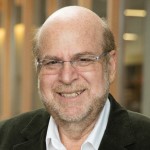
CEDAR Directors Sadik Esener was named interim director of the new Center for Biomedical Data Science, a collaboration with the University of Oregon. The center will empower researchers at both institutions to attack cancer with big data, combining efforts at the Knight Cancer Institute with those at the University of Oregon's Phil and Penny Knight Campus for Accelerating Scientific Insight. Esener will work closely with Bill Cresko, interim director of the UO program, as well as with scientific codirectors Xubo Song and Emek Demir, both CEDAR members.
Esener said one of the early goals the newly formed leadership team will prioritize is establishing a culture that promotes innovation by initiating collaborative projects between data generators and data analysts. “A key goal of mine will be to integrate the Center within the Knight Cancer Institute,” he says. “We want to encourage strong collaboration and interaction with teams across the institute, including CEDAR, Precision Oncology, Beat AML and any interested physicians and faculty members. I believe increased communication and collaboration among these groups will have a positive impact on the Knight Cancer Institute and OHSU overall.”
GRAIL Pathfinder study findings published in The Lancet
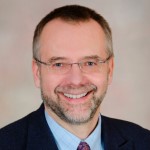
GRAIL's multi-cancer early detection (MCED) test demonstrated that the test identified many cancer types that currently lack recommended screening tests, enabling target cancer diagnostic evaluations, and supporting diagnostic resolution for the majority of participants in under three months, according to a new article published in The Lancet. The test was the central component of the Pathfinder study, conducted in 6,662 adults over the age of 50 without symptoms suggestive of cancer. The study was conducted with several partner institutions. Tom Beer, former Chief Medical Officer of CEDAR, led the study at OHSU and coauthored The Lancet publication.
Luiz Bertassoni and team featured on the cover of Advanced Healthcare Materials
Research from Luiz Bertassoni, assistant professor with the OHSU School of Dentistry and CEDAR member, and colleagues was featured on the cover of Advanced Healthcare Materials in September 2023. The team from the Knight Cancer Precision Biofabrication Hub devised a minimally invasive strategy for repairing lost or injured tissue using bioprinted microgels laden with stem cells and endothelial cells that grow functioning blood vessels. When injected into tissue defects, newly formed capillaries in the constructs readily merge with host blood vessels and promote connective tissue formation.
CEDAR Assistant Professor Joshua Moreau receives funding awards

CEDAR's Joshua Moreau, assistant professor with the OHSU Division of Oncological Sciences, is the recipient of two prestigious funding awards. Moreau, who joined CEDAR in June 2022, explores the earliest interactions between cancer and the immune system, within the tissues where cancer cells arise.
He was awarded grants by both the Elsa U Pardee Foundation, which funds research to investigators identifying new treatments or cures for cancer, to investigate the role of skin-resident B cells in cancer; and the LEO Foundation, for his work investigating the potential role of B cells in the inflammatory skin disease hidradenitis suppurativa.
Aaron Grossberg receives faculty award
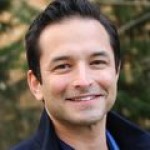
CEDAR Member and Assistant Professor of Radiation Medicine Aaron Grossberg is one of three OHSU scientists to receive the 2023 Faculty Excellence and Innovation Awards, made possible by the Silver Family Innovation Fund. As part of the award, Grossberg will receive $750,000 over three years to expand his laboratory's ability to study how cancer affects the metabolism of fat and muscle, and to identify new drug targets to prevent or reverse the process of cancer-related weight loss, also known as cachexia.
This metabolic condition prevents the body's normal ability to gain weight and preserve strength, adversely impacting patients' fitness to receive the best treatments for their cancer.
Matthew Rames honored as Early Career Innovator of 2023
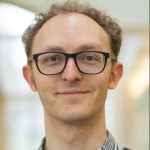
OHSU Innovates honored CEDAR Postdoctoral Scholar Matthew Rames as one of three Early Career Innovators for 2023. The award is given annually to a student, postdoctoral researcher or resident who shows a passion for innovation and works on novel technologies that tackle real-world problems. The honor recognizes Rames' work with the OHSU Technology Transfer Office on a project aimed at developing new ways of conjugating labels to antibodies for multiplex imaging. His work will be celebrated at the 2023 OHSU Innovation Awards on March 22, 2023. Rames earned his Ph.D. at OHSU in 2022.
Carolyn Schutt Ibsen receives faculty award
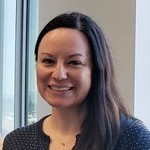
The Biomedical Engineering Society's Cell and Molecular Bioengineering Conference selected CEDAR's Carolyn Schutt Ibsen, Ph.D., for its 2023 Rising Star Junior Faculty Award for her outstanding work in the field of cell and molecular bioengineering. She was recognized at a gala dinner and provided a podium presentation in a special session at the annual conference.
This special-interest group brings together researchers with diverse scientific and clinical interests with a common goal of understanding and engineering molecules, cells, their interactions and microenvironments in the pursuit of controlling biological processes and improving the practice of medicine.
CEDAR interns represent in international science competition
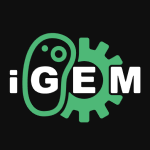
Five CEDAR interns from OHSU's Summer Equity Research Program (Shawn Ichikawa, Chivon Ou, Shelby Sawyer, Matthew Tokuda and Gavin Magill) competed in the International Genetically Engineered Machines (iGem) Competition in Paris from Oct. 26 to Oct. 28, 2022. The team developed its cancer early detection project with CEDAR mentors Michael Brasino, Joshua Saldivar and Carlos Origel Alberto Marmolejo.
The project seeks to create a more accessible, cost-effective alternative to the present models of detecting the overexpression of c-Myc mRNA. Their aim was to create a cancer early-detection diagnostic tool that most clinicians can acquire to determine if their patients may have cancer by taking their patient’s blood sample and inputting that sample onto an agar plate with bioengineered E. coli bacteria, which is designed to proliferate only in the presence of cancerous c-Myc mRNA. You can read more about their project at iGem's Wiki.
Blood test developed by CEDAR researchers holds promise for early treatment
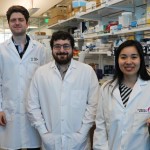
CEDAR researchers have devised an accurate and novel way to test blood to see if a pre-cancerous condition is escalating to outright cancer—potentially enabling treatment early in tumor development when cancer is more likely to be curable. The team, led by Thuy Ngo, a member of CEDAR and associate professor of molecular and medical genetics in the OHSU School of Medicine, developed a test that looks for cell-free messenger RNA biomarkers to distinguish multiple myeloma blood samples from non-cancer samples with 90% accuracy, and multiple myeloma from its pre-malignant condition with 100% accuracy.
They were able to distinguish liver cancer samples from noncancer with 93% to 100% accuracy, and liver cancer from cirrhosis with 100% accuracy. The research, published in NPJ Precision Oncology, lays the foundation for developing inexpensive assays that measure levels of cell-free RNA in blood for a small panel of genes that can differentiate cancer from pre-malignant conditions. Ngo and OHSU have filed a patent on their findings. More information on this research is available from OHSU News.
The importance of accelerating early-detection research
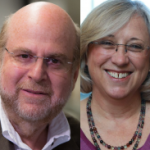
Cancer early-detection research can transform patient survival, but there are still significant obstacles preventing the translation of new research findings into the clinical setting, assert leaders of the field, including CEDAR's Sadik Esener and the Knight Cancer Institute's Lisa Coussens, in a new publication in the journal Science. Around half of all cancers are diagnosed at an advanced stage, despite the fact that treatments stand the best chance at improving survival when implemented early.
“Late-stage detection of cancer is a global problem that is exacerbated in resource poor settings, demonstrating that equity is a considerable challenge,” the authors observe. “Patients diagnosed with later-stage cancer can miss the window for curative intervention, and expensive later-stage systemic treatments are often associated with severe side effects and worse outcomes.”
At CEDAR, researchers are investigating cancer's early changes, and applying this knowledge to work on new, inexpensive screening tests, determining which cancers need vigorous early intervention, and directing precision therapies to reduce drug toxicity. You can read more about the article's findings on the Knight Cancer Institute's Cancer Translated blog.
Ece Eksi discusses new clues to prostate cancer
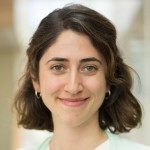
CEDAR postdoctoral scholar Sebnem (Ece) Eksi spoke with the Knight Cancer Institute's Cancer Translated blog about findings that could help identify more dangerous prostate cancers earlier, giving researchers new tools to stop them. Only a fraction of prostate cancers become life-threatening, but predicting which ones is challenging.
Eksi and her team found that two signaling proteins used by nerve cells can become active in and around prostate tumors, and may play a role in driving the cancers to be deadly. She discussed the discovery, published in Nature Communications, with Cancer Translated, including how the findings could help molecular biologists working on other cancer types.
Kemal Sonmez recognized as distinguished alumnus
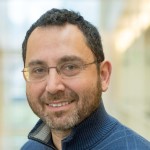
CEDAR member Kemal Sonmez was recognized as a Distinguished Alumnus for 2021 by the University of Maryland College Park "for their leadership and meritorious contributions to the field of engineering, their humanitarian efforts, and the application of their engineering education to other disciplines." Sonmez received his Ph.D. at the University of Maryland College Park.
CEDAR graduate student Kylene Lowrey wins award
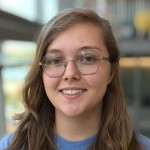
CEDAR graduate student Kylene Lowrey took home first place in the poster session at the All Oregon Bioengineering Symposium. She presented "3D Bioprinting Ultrasound-Responsive Materials for Cellular Manipulation in 3D Tissue Constructs," which also included CEDAR authors Luiz Bertassoni and Carolynn Schutt. At CEDAR, Lowrey works on creating cell cultures in hydrogels and using ultrasound to facilitate localized release of microbubbles in these hydrogels. She worked for several years in materials science, specifically creating unique inorganic nanoarchitectures.
CEDAR team's work published in Communications Biology
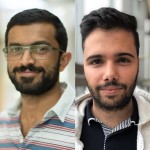
CEDAR researchers Jose Luis Montoya Mira and Ajay Sapre, alongside teammates Kyle Gustafson, Gene Tu, Jared Fischer, Roger Chiu and Sadik Esener published "Label-free enrichment of rare unconventional circulating neoplastic cells using a microfluidic dielectrophoretic sorting device" in Communications Biology on Sept. 24, 2021. The team reported on the development of a label-free dielectrophoretic microfluidic platform facilitating enrichment of CHCs in a high-throughput and rapid fashion by depleting healthy peripheral blood mononuclear cells (PBMCs). This represents a promising approach to non-invasively analyzing tumor cells from patients.
Defense Department Idea Award for CEDAR's Thuy Ngo

Thuy Ngo, Ph.D., received a Peer Reviewed Cancer Research Program Idea Award from the Defense Department for a project to identify blood biomarkers for early diagnosis and treatment monitoring of liver cirrhosis and cancer. Ngo is an assistant professor of molecular and medical genetics in the OHSU School of Medicine and a member of CEDAR, the Knight Cancer Institute's Cancer Early Detection Advanced Research Center.
Liver cancer, or hepatocellular carcinoma, is the fourth leading cause of cancer-related deaths worldwide. Clinical blood tests have low sensitivity to detect liver cancer at early stages and are not effective for the reliable diagnosis of cirrhosis, which puts people at high risk of liver cancer. Patients with liver cancer are often diagnosed with inoperable disease. The Defense Department's $769,996 award supports Ngo's proposal to identify cell-free RNA biomarkers (including messenger RNA, circular RNA, transposable elements and microbial transcripts) that can detect cirrhosis and monitor its progression to liver cancer.
Thuy Ngo awarded Komen grant
The Susan G. Komen Breast Cancer Foundation announced 30 new grants to leading researchers across the U.S. and Canada — including CEDAR member and assistant professor of molecular and medical genetics Thuy Ngo, Ph.D. Ngo was awarded a Career Catalyst Research Grant to study the use of cell-free RNA found in blood as a way to monitor if a treatment is successful for patients with metastatic breast cancer. This method provides the opportunity to gain a deeper understanding of the behavior and characteristics of the metastatic tumor, and to monitor changes in metastatic lesions and responses to treatment. A full list of 2021 research grants can be found at Komen.org.
CEDAR/SMMART collaboration receives funding from the Kuni Foundation
The Kuni Foundation awarded almost $1.5 million to a collaborative project between CEDAR and SMMART, a first-of-its-kind platform designed to rapidly identify combinations of drugs that can stop tumors before they adapt and become drug-resistant. Currently, patients must have two biopsies at a major cancer center to enroll in the program. This is a barrier for people who lack the means to access a major cancer center, including rural, BIPOC and underserved communities.
The project, "Blood Biopsies as a Cost-Effective Approach to Democratize Personalized Therapy for OA & WA Patients," is developing approaches that will decrease the need for surgical biopsies by analyzing blood samples for material that escapes from tumors and goes into the bloodstream. This blood can be drawn at any clinic and shipped to OHSU. The award features CEDAR's Thuy Ngo as a co-investigator. Gordon Mills, director of precision oncology at the OHSU Knight Cancer Institute, is the principal investigator.
Aaron Grossberg receives Science of the Patient Award from AACR
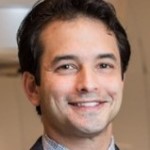
OHSU physician-scientist Aaron Grossberg, M.D., Ph.D., was among the first recipients of the new Science of the Patient Award from the American Association for Cancer Research (AACR) and The Mark Foundation for Cancer Research. Grossberg is a co-investigator alongside principal investigator Daniel L. Marks, M.D., Ph.D., on research investigating the wasting syndrome cachexia in pancreatic cancer.
In advanced cancer and other diseases, cachexia can erode quality of life and hasten death. Marks and Grossberg are focusing on the role of the autonomic and neuroendocrine stress responses in pancreatic cancer cachexia. Marks is a professor of pediatrics and senior associate dean for research in the OHSU School of Medicine. Grossberg is an assistant professor of radiation medicine with a joint appointment with CEDAR and the Brenden-Colson Center for Pancreatic Care. The Science of the Patient Award was established to stimulate groundbreaking research exploring the influence of biology of the patient on cancer genesis, development, treatment and survivorship.
Carolyn Schutt Ibsen speaks with the Cancer Translated blog

Carolyn Schutt Ibsen, Ph.D. is an assistant professor of biomedical engineering in the OHSU School of Medicine and a member of CEDAR. In an interview with the Knight Cancer Institute's Cancer Translated blog, she discussed her research, which investigates the use of "energy-responsive" biomaterials that can be controlled remotely using ultrasound to model cancer progression, as well as to guide the repair of living tissue. In the wide-ranging conversation with CEDAR postdoctoral scholar Kathryn Baker, Ph.D., Schutt Ibsen discusses her work's potential, the challenges of modeling cancer progression, and how CEDAR's multidisciplinary environment is critical for her research.
Bruce Branchaud named National Academy of Inventors Fellow
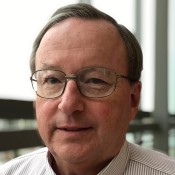
CEDAR Distinguished Scientist and University of Oregon professor emeritus Bruce Branchaud, Ph.D., was named a National Academy of Inventors Fellow, the highest professional distinction for academic inventors. The 2020 Fellow class represents 115 research universities and governmental and nonprofit research institutes worldwide. The NAI Fellows Selection Committee selects candidate that have "demonstrated a highly prolific spirit of innovation in creating or facilitating outstanding inventions that have made a tangible impact on the quality of life, economic development, and welfare of society."
Branchaud joined CEDAR in 2017. He has research experience spanning synthetic organic chemistry, mechanistic/physical organic chemistry, chemical biology, biochemistry, enzymology, chemistry-enabled biotechnology, and biochemistry-enabled biotechnology. He has been a faculty member with the University of Oregon for 37 years and has held several leadership positions in the biotech industry, including serving as director of global chemistry at Invitrogen, where he first worked with CEDAR Director Sadik Esener.
Joshua Saldivar named among the most 100 inspiring Hispanic/Latinx scientists in America
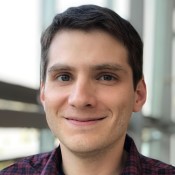
CEDAR's Joshua Saldivar, Ph.D., was named one of the 100 most inspiring Hispanic/Latinx scientists in America by Cell Press's Cell Mentor. In honor of National Hispanic Heritage Month, Cell Mentor showcased 100 of the United States' most impressive Hispanic/Latinx scientists. The list — selected based on scholarly achievements, mentoring excellence, and commitment to diversity, equity, and inclusion — highlights scientists across academia, government and industry.
Dr. Saldivar is an assistant professor of the Division of Oncological Sciences and a CEDAR scientist. His work focuses on how cells coordinate nuclear processes, such as DNA replication and transcription, through various signals, epigenetic marks and chromatin regulators that intersect within phase-separated condensates. He uses cutting-edge microscopy approaches and powerful sequencing technologies to uncover the elegant and dynamic biology of chromatin. His long-term goals are to understand how these nuclear processes become destabilized in premalignant cells and drive epigenetic reprogramming and malignant transformation, as this will help us determine which early cancers are likely to become lethal. He joined CEDAR in fall 2018.
Hisham Mohammed speaks with the Knight Cancer Institute's Cancer Translated blog
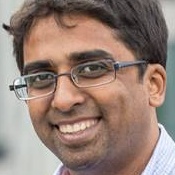
The Knight Cancer Institute's Cancer Translated blog spoke with CEDAR's Hisham Mohammed, Ph.D. Mohammed, an assistant professor of molecular and medical genetics in the OHSU School of Medicine and scientist in CEDAR, helped create a way to peer into individual cells and take multiple measures of gene activity and gene regulation at the same time. He's leading the first efforts to apply that single-cell multi-omic research method to cancer. Cancer Translated spoke with him about the method's prospects for resolving questions into how fundamental biological processes go wrong and begin to regulate and drive cancer—which is key to detecting and treating early cancer.
Beverly Emerson honored as fellow of the American Academy of Arts & Sciences
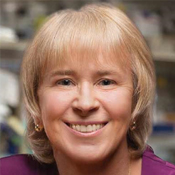
Molecular biologist Beverly Emerson, Ph.D., joined an accomplished roster of scientists, artists, scholars and all-around leaders who were elected fellows of the American Academy of Arts & Sciences. The 2020 class included singer-songwriter-activist Joan Baez, former Attorney General Eric Holder, novelist Ann Patchett, and indie filmaker Richard Linklater. Emerson is a distinguished scientist with CEDAR, and a professor emeritus at the Salk Institute for Biological Studies.
Using radiation to boost circulating DNA for ‘liquid biopsies’ of cancer
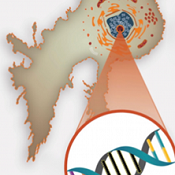
Testing for tumor DNA in blood is easier and safer than taking a biopsy of tumor tissue. The problem is, early-stage tumors may not shed enough DNA to find in a blood draw. Researchers at OHSU are working on a way to use radiation to increase the amount of tumor DNA in blood. They’ve shown that patients with suspected lung tumors show a sharp increase in circulating tumor DNA after treatment with stereotactic body radiation therapy, or SBRT.
International alliance sets bold research ambition to detect the (almost) undetectable
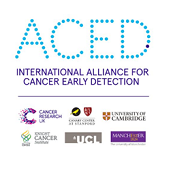
The OHSU Knight Cancer Institute, together with collaborators across the U.S. and the U.K., announced the formation of the International Alliance for Cancer Early Detection, or ACED. This alliance is formed by the coordinated efforts of Cancer Research UK, Canary Center at Stanford University, the University of Cambridge, the OHSU Knight Cancer Institute, University College London (UCL) and the University of Manchester.
Building a world-class team of women scientists
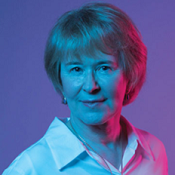
Women in the Knight Cancer Institute are making significant advancements in their fields. Onward, the magazine of the OHSU Foundation, profiled nine of them. Tackling a problem as big as cancer is often a matter of moving one step forward, two steps back. It requires patience and persistence and an unwavering belief that the answer is out there — at least, that’s the way Beverly Emerson, Ph.D., sees it.
The promise of early detection: Watch Sadik Esener's Marquam Hill Lecture
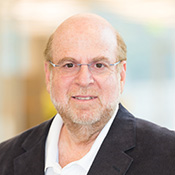
Sadik Esener, Ph.D., is building a multidisciplinary team to reveal the evolutionary biology of cancer to develop low-cost screening, determine which cancers to aggressively treat and leverage precision therapies to minimize toxicity. The Wendt Family Chair professor of biomedical engineering in the OHSU School of Medicine and director of the Knight Cancer Institute Cancer Early Detection Advanced Research center (CEDAR), Dr. Esener and his team's goal is to find and eliminate lethal cancers at the earliest stage with little harm to the patient.